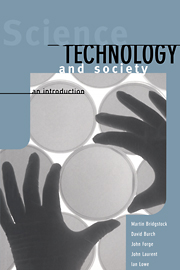Book contents
- Frontmatter
- Contents
- List of Figures
- List of Tables
- List of Contributors
- Preface
- Part One Scientific and Technological Communities
- 1 Introduction
- 2 The Scientific Community
- 3 Responsibility and the Scientist
- 4 The Rights and Wrongs of Science
- 5 Controversies Regarding Science and Technology
- Part Two Scientists and Technologists in the Wider Society
- Appendix 1 Surviving in the Information Jungle
- Appendix 2 Referencing
- Index
4 - The Rights and Wrongs of Science
Published online by Cambridge University Press: 04 February 2010
- Frontmatter
- Contents
- List of Figures
- List of Tables
- List of Contributors
- Preface
- Part One Scientific and Technological Communities
- 1 Introduction
- 2 The Scientific Community
- 3 Responsibility and the Scientist
- 4 The Rights and Wrongs of Science
- 5 Controversies Regarding Science and Technology
- Part Two Scientists and Technologists in the Wider Society
- Appendix 1 Surviving in the Information Jungle
- Appendix 2 Referencing
- Index
Summary
Science has been getting some bad press over the last decade or two. More and more scientists have been accused of behaving badly. In some cases, they have been accused of mistreating human or animal subjects. In other cases, they have falsified their findings, or simply accepted behaviour by other people which was clearly wrong. As John Forge argued in the last chapter, it is reasonable in many circumstances to regard scientists as responsible for the effects of their conduct, and in this chapter we shall see what that conduct was, and what the consequences were.
To think about right and wrong conduct in science, we have to know two things. We have to know what the conduct is, and we have to know by what standards to judge it. As we shall see, this is often very difficult. This chapter will take you through some cases in which scientists behaved very badly. We shall look at some of these, and ask why they did so. In other cases, there is fierce debate about whether they did right or wrong. We will look at the arguments on both sides.
The great sociologist Robert K. Merton regarded science as a self-policing system. In his view, apprentice scientists are rapidly educated in what is, and is not, acceptable behaviour in science. Further, once they are working in science, their conduct is constantly under scrutiny.
- Type
- Chapter
- Information
- Science, Technology and SocietyAn Introduction, pp. 56 - 82Publisher: Cambridge University PressPrint publication year: 1998

